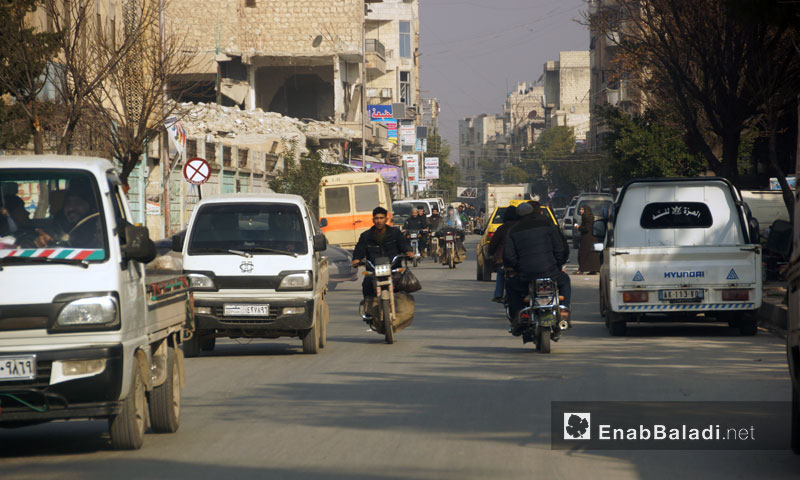The volume of the military confrontations in Idlib governorate rose and broke the limits, penetrating the domestic life of the people there, for they had a replica among the people of the same family. The family members and the relatives were divided in their loyalty, as each one of them chose a certain side of the conflict and stuck to it, especially that the internal fighting has entered its second week, between “Hay’at Tahrir al-Sham” and the “Syrian Liberation Front,” while the field control map still lacks clear-cut borders.
With the confrontations growing dense between the two sides to the conflict, civilians, in Idlib, were triggered by realistic incidents that took place in the governorate, to ask, “would a brother kill his own brother, if he happened to be in the lines of the opposite faction?”
Atton’s Father Acts for “Ahrar al-Sham”
The story of the two factions’ leaders stand as a sufficient example for this phenomenon, for many people do not, actually, know that the father of the General Cleric in “Tahrir al-Sham,” Abdul Rahim Atton, nicknamed “Abu Abdullah al-Shami” works as a Cleric within “Ahrar al-sham,” called Abdul Halim.
The General Cleric in “Tahrir al-Sham” is recognized for his speech of enticement against the “Syrian Liberation Front,” which joins the two movements of “Ahrar Al-Sham” and “Nour al-Din al-Zenki,” the counter side, on which his father is directing the fighters of the “Front” throughout the battle.
The disputes within the same family reached the point of killing; Mohammad al-Yousef, who fights for a faction that he refused to unfold its name, said that he has been through many struggles, pointing out that “the phenomenon of the fighter brothers, who belong to opposing factions is not new, and sometimes they indulged into direct confrontations due to the factions’ methodologies.”
It is real, a brother has already killed his brother and another fighter killed his father and mother on the pretext of “apostasy,” when the “Islamic State’s” ISIS dogmatism started to prevail, according to Mohammad, who explained to Enab Baladi, that he and his brother stopped talking for two months due to dispute inspired by Sharia rulings, to reconcile and resume their normal relationship later on.
The Factions are Inflating the Chasm
According to the fighter, the factions are also playing a role in inflating the filial chasm and dispute, explaining that “the Sharia-based courses are producing fighters, that immediately start to issue charges of unbelief, Takfir, and apostasy which necessitate killing the practitioner, believing that they are implementing the religious rulings, but they are wrong.”
Videos and voice recordings of some of the factions’ clerics spread, in which, they are enticing their fighters to kill; the most famous of these is the one presenting “Abu Ykzan al-Masri,” a cleric in “Tahrir al-Sham,” during the fight with “Ahrar al-Sham,” in which he called the fighters “to hit the head,” as an indication to the necessity for killing the fighters on the other side, which widened the gap between the fighters.
Mohammad believes that fighting can be avoided, in general, and among siblings, in particular, through “alienation from confusing ideas that call for killing, and by searching for correct and honest sources,” calling those who are unable to control the dispute, to stick to home, “so the brother would not be responsible for his brother’s blood.”
Spare the Father and the Son from the Dispute
Abdul Razzaq Farkan is a fighter in the lines of the “Syrian Liberation Front;” he tells Enab Baladi that his father acts under “Tahrir al-Sham;” however, they are living under the same roof without discussing the fighting issues.
“We do not address our attitudes concerning fighting, for each person has his/her own ideas and principles,” according to Mohammad, who adds that “we only exchange the Godspeed expression upon laving the house. I am scared for him; he feels the same about me; the nature of his work in the relief field, under Tahrir al-Sham, probably have lessened the sharpness of the dispute between us.”
The father and the son exchange advise; “we do it decently,” Abdul Razzaq said.
Enab Baladi tried to examine the reaction of the fighting factions in Idlib about the discussed issue; nonetheless, it received no answers.
Most of the people who commented on the phenomenon describe the situation in which fighting has reached the point of killing as “a dangerous thing;” others mentioned the tendency among a few fighters, who are showing abstinence from fighting, choosing not to discuss their own and their family or relatives’ attitudes and perspectives concerning the fighting.

